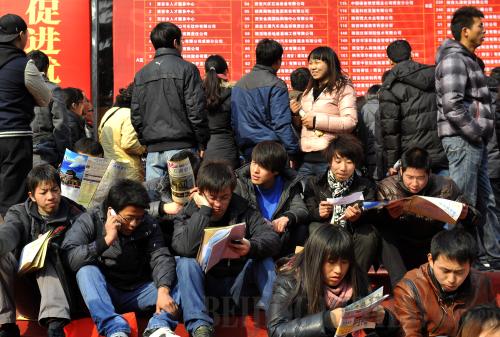|
 |
|
ANXIOUS JOBSEEKERS: A large crowd wait at a job fair in Xi'an, capital of northwest China's Shaanxi Province on February 11 (LIU XIAO) |
Li Gaoping, a migrant worker from a village in north China's Hebei Province, came to Beijing for a weekly job fair. This was Li's second time on the hunt for a job after the Spring Festival, which fell on January 23 this year.
Li used to be an advertisement salesman in Beijing, earning about 3,000 yuan ($476) each month. In October 2011, he quit his job due to family issues in his hometown. After all his leads turned up dry, he returned to the capital.
The job fair Li attended was set up for unskilled laborers. Most job seekers there don't have a bachelor's degree. Each district of Beijing has a similar job fair, available for companies that have lower requirements for job hunters' education background.
This time, about 100 companies were recruiting employees at the job fair, providing nearly 1,000 job vacancies. But only 200 people showed up. Li perused the requirements of each company, searching for any suitable information. But by the day's end, Li left disappointedly.
In the current job market, a contradiction is making it increasingly difficult for companies and job seekers to find a common ground: Companies don't have enough employees and job seekers can't find suitable jobs.
The problem isn't that China lacks job vacancies or a labor force. But "labor shortage" and "employment difficulty" coexist.
Li said he could not accept wages that won't allow him to maintain a decent living. Generally, employers only give 1,000 yuan ($158.8) to 2,500 yuan ($397) each month to job seekers like Li.
"In a big city like Beijing, you can hardly feed yourself with 2,500 yuan ($397) a month," said Li.
The problem is being addressed in the Employment Promotion Plan (2011-15) recently issued by the State Council on February 7. The plan says the country will reform its income distribution mechanism. During the 12th Five-Year Plan period (2011-15), the minimum wage will be increased by at least 13 percent annually and the minimum wage in most regions should reach at least 40 percent of local urban employees' average wage.
The plan, jointly initiated by several key government departments, is the first national plan for promoting employment.
"In the future, promoting employment will be a top priority for China's social and economic development," said Yu Faming, Director of the Department of Employment Promotion of the Ministry of Human Resources and Social Security.
"China is a developing country with the biggest population and the largest group of laborers in the world. Giving employment promotion top priority is in accordance with the real conditions in the country," Yu said.
Key indexes, such as the increased urban employment and registered urban unemployment rate, will be added to the evaluation of local governments. Giving employment promotion a top priority, as is stipulated in the plan, is a compulsory task for local governments, he said.
But Li thinks the 13-percent annual wage hike stipulated in the plan may be a dream beyond reaching. Wages depend on companies' performance that is influenced by a number of factors.
Price hikes of raw materials, global economic recession, and the yuan's appreciation all contribute to fewer economic gains among Chinese enterprises. Some can hardly survive, not to mention giving employees salary boosts.
This may be the reason why they can't promise higher wages to job seekers. During the past two years, China's minimum wages increased sharply, especially in some east coastal cities where workers' annual average income increased 10-15 percent. But due to the previous low wages and soaring CPI, China's minimum wages are still less than countries or regions at the same development level.
A bigger contradiction in the job market results from the integration of migrant workers into cities. Migrant workers account for the biggest part of demand in China's labor market, but they are discriminated in social security because they lack hukou, or permanent household registration, in cities they work in.
| 